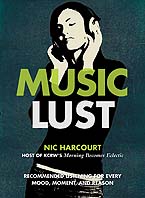{Live Music Lust: Music Lust Author Nic Harcourt to Appear at The Sunset on Thursday, October 27th, 2005 to Take Fans Through A Critical Musical Journey.}
Nic Harcourt is a popular music-loving obsessive, who seems to know something about every form of it, and his own fecund taste has enabled him to recognize the tasteful talents of Coldplay, Norah Jones, and David Gray and put them on the airwaves via KCRW.
Seattle's own Sasquatch Books, known for sharp, fun, and helpful aides such as "The Scarecrow Movie Guide" and "Book Lust", has published "Music Lust" as a way to acquaint listeners with the smorgasbord of musical choices glutting record stores.
The sexy little trade paperback features tight chapters on everything from the general interest ("Beatles Top Ten," "Jimi Hendrix: Icon," "This Is Reggae Music") to a deeper slice of the fields that scrape the charts ("Madchester," "Erin Go Brah: Irish Music," "Queens of Punk"), from the time-consensus exquisite (his own "Desert Island Discs" lists everything from Petula Clark to Gang of Four), to the timelessly tasteless ("Don't Quit Your Day Job: TV Actors Who've Taken The Plunge" and "What Were They Thinking? Ten Albums The World Could've Lived Without").
Harcourt is lucky to have had a lifetime of tracing the explosion of the Beatles in their homeland (his first album was Sgt. Pepper's when it came out), being transfixed by the audacity of Jimi Hendrix on "Top Of The Pops," then sliding into metal-adoration through its most spine-shattering years of the early 70s, following the trail of progressive rock from it to London Calling.
Yes, he was a late-comer to punk, but it is just that hesitation not to be trendy that probably proves the balance of his tastes, and makes him fairly trustable. He tests the spirits and rarely errs with his assessment of quality records. I could quibble about what the most important records of the new millenium are so far, or if The Pretenders are actually "punk" and not just one of the best rock bands ever for their first three albums, or maybe that perhaps The Pixies need a little more credit, but so it goes with music fans.
The book begins with a chapter on "Afro-Beat," so even if the encyclopedia format of the guide poses an immediate offering of possibly unknown information to a casual music fan, I suspect most people will read "Music Lust" poking around throughout.
While Harcourt and I may disagree about the most important records in various categories, I respect his intelligence in the selections, and feel a lot more integrity in this format and content than in many of the mass market magazine "Album Guides" that have come out in the past few years. This book is hardly definitive, but the answer to that is more personal guides like this, not to spend time being contentious with this one. Flip through it at a local bookstore and see for yourself.
